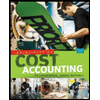Milano Co. manufactures and sells three products: product 1, product 2, and product 3. Their unit selling prices are product 1, $40; product 2, $30; and product 3, $20. The per unit variable costs to manufacture and sell these products are product 1, $30; product 2, $15; and product 3, $8. Their sales mix is reflected in a ratio of 6:4:2. Annual fixed costs shared by all three products are $270,000. One type of raw material has been used to manufacture products 1 and 2. The company has developed a new material of equal quality for less cost. The new material would reduce variable costs per unit as follows: product 1 by $10 and product 2 by $5. However, the new material requires new equipment, which will increase annual fixed costs by $50,000. If the company continues to use the old material, determine its break-even point in both sales units and sales dollars of each individual product. If the company uses the new material, determine its new break-even point in both sales units and sales dollars of each individual product. (Round to the next whole unit.) What insight does this analysis offer management for long-term planning?
Milano Co. manufactures and sells three products: product 1, product 2, and product 3. Their unit selling prices are product 1, $40; product 2, $30; and product 3, $20. The per unit variable costs to manufacture and sell these products are product 1, $30; product 2, $15; and product 3, $8. Their sales mix is reflected in a ratio of 6:4:2. Annual fixed costs shared by all three products are $270,000. One type of raw material has been used to manufacture products 1 and 2. The company has developed a new material of equal quality for less cost. The new material would reduce variable costs per unit as follows: product 1 by $10 and product 2 by $5. However, the new material requires new equipment, which will increase annual fixed costs by $50,000.
- If the company continues to use the old material, determine its break-even point in both sales units and sales dollars of each individual product.
- If the company uses the new material, determine its new break-even point in both sales units and sales dollars of each individual product. (Round to the next whole unit.)
- What insight does this analysis offer management for long-term planning?
Trending now
This is a popular solution!
Step by step
Solved in 6 steps with 6 images









